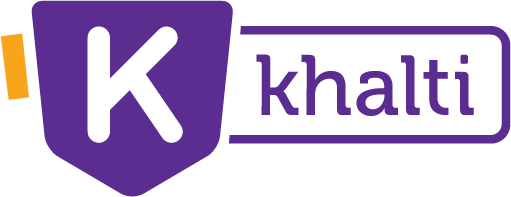Khalti Flutter SDK¶
Khalti Payment Gateway SDK for Flutter with default payment interface, works out of the box without having to add any additional user interface.

Khalti Payment Gateway for Flutter
Introduction¶
Read the introduction here.
Getting Started¶
Integrating Khalti Payment Gateway requires merchant account. You can always create one easily from here.
Tip
A merchant account is required for integration.
Access Information
For Sandbox Access
Signup from here as a merchant.
Please use 987654 as login OTP for sandbox env.
For Production Access
Please visit here
Test Credentials for sandbox environment
Test Khalti ID for 9800000000 9800000001 9800000002 9800000003 9800000004 9800000005
Test MPIN 1111
Test OTP 987654
Read the steps to integrate Khalti Payment Gateway in details here.
Supported Platforms¶
| Android | iOS | Web | Desktop (macOS, Linux, Windows) |
|---|---|---|---|
| ✔️ | ✔️ | ❌ | ❌ |
Setup¶
Detailed setup for each platform.
Launching Payment Interface¶
Generating the pidx¶
A unique product identifier pidx must be generated via a server side POST request before being able to proceed. Read here for information on how one can generate pidx along with other extra parameters.
Khalti Initialization¶
Before being able to launch Khalti payment gateway, it is necessary to initialize Khalti object. The initialization can be done by a static init() method.
It is suggested that the initialization be done inside the initState method of a StatefulWidget.
class KhaltiSDKDemo extends StatefulWidget {
const KhaltiSDKDemo({super.key});
@override
State<KhaltiSDKDemo> createState() => _KhaltiSDKDemoState();
}
class _KhaltiSDKDemoState extends State<KhaltiSDKDemo> {
late final Future<Khalti> khalti;
@override
void initState() {
super.initState();
final payConfig = KhaltiPayConfig(
publicKey: '__live_public_key__', // Merchant's public key
pidx: pidx, // This should be generated via a server side POST request.
environment: Environment.prod,
);
khalti = Khalti.init(
enableDebugging: true,
payConfig: payConfig,
onPaymentResult: (paymentResult, khalti) {
log(paymentResult.toString());
},
onMessage: (
khalti, {
description,
statusCode,
event,
needsPaymentConfirmation,
}) async {
log(
'Description: $description, Status Code: $statusCode, Event: $event, NeedsPaymentConfirmation: $needsPaymentConfirmation',
);
},
onReturn: () => log('Successfully redirected to return_url.'),
);
}
@override
Widget build(BuildContext context) {
// Rest of the code
}
}
BREAKING CHANGE
Starting with version 1.0.0-dev.5, it is no longer necessary for the developers to manually add return_url within KhaltiPayConfig. The SDK handles the fetching and proper usage of return_url.
The static init() method takes in a few arguments:
- enableDebugging: A boolean argument that is when set to true can be used to view network logs in the debug console. It is set to
falseby default. -
payConfig: An instance of
KhaltiPayConfig(). It is used to set few config data. The instance ofKhaltiPayConfigtakes in few arguments:final payConfig = KhaltiPayConfig( publicKey: '__live_public_key__', // Merchant's public key pidx: pidx, // This should be generated via a server side POST request. environment: Environment.prod, );- publicKey: Merchant's live or test public key provided by Khalti.
- pidx: Unique product identifier received after initiating the payment via a server-side POST request.
- environment: An enum that determines whether test API or production API should be invoked. Can be either
Environment.prodorEnvironment.test. Set toEnvironment.prodby default.
-
onPaymentResult: A callback function that is triggered if the payment is successfully made and redirected to merchant's return URL. The callback takes in two arguments.
- paymentResult: An instance of
PaymentResultclass. It provides some informations about the payment after it is successfully made. Following data is provided by this instance.- payload: An instance of
PaymentPayload. It contains general informations such aspidx,totalAmount,transactionId,status,fee,refunded,purchaseOrderId,purchaseOrderNameandextraMerchantParamsregarding the payment made.
- payload: An instance of
- khalti: An instance of
Khalti. Can be used to invoke any methods provided by this instance.
- paymentResult: An instance of
-
onReturn: A callback function that gets triggered when the return_url is successfully loaded.
-
onMessage: A callback function that is triggered to convey any message. It gets triggered when any issue is encountered or when any general message is to be conveyed. In case of error, this callback provides error informations such as error description and status code. It also provides information about why the error occured via
KhaltiEventenum. This enum consists of:Additionally, it also provides a boolenum KhaltiEvent { /// Event for when khalti payment page is disposed. kpgDisposed, /// Event for when return url fails to load from the API. returnUrlLoadFailure, /// Event for when there's an exception when making a network call. networkFailure, /// Event for when there's a HTTP failure when making a network call for verifying payment status. paymentLookupfailure, /// An unknown event. unknown }needsPaymentConfirmationwhich needs to be checked. If it is true, developers should invoke payment confirmation API that is provided by the SDK to confirm the status of their payment. The callback also provides the instance ofKhalti.
Loading payment interface¶
The SDK internally uses flutter_inappwebview to load the khalti payment gateway. SDK users should invoke open() method provided by the SDK to push a new page in their route.
Payment verification API¶
A payment verification API that confirms the status of the payment made, is already called by the SDK internally. However, if the users receive needsPaymentConfirmation as true in onMessage callback, they are supposed to called the payment verification API manually to be sure about the payment status. It can be done with a method provided by the Khalti instance.
The instance of Khalti is provided in the onPaymentResult and onMessage callback which can be used to invoke any public functions provide by Khalti class.
Closing the Khalti payment gateway page¶
After payment is successfully made, developers can opt to pop the page that was pushed in their route. The SDK provides a close() method.
Example¶
For a more detailed example, check the examples directory inside khalti_flutter package.








